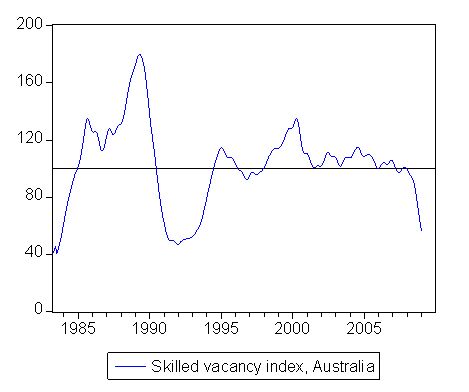I started my undergraduate studies in economics in the late 1970s after starting out as…
Skilled vacancies take a dive …
The government (Department of Education, Employment and Workplace Relations) released the January Vacancy report today which provides some information about the demand-side of the labour market. The Skilled Vacancy Index (SVI) is published monthly by the DEEWR and is based on the number of skilled vacancy advertisements in major newspapers . I have written a fair bit about the so-called skills shortage and have concluded that the SVI data does not support a case that a large skills gap has developed in aggregate terms in the last several years as the boom peaked. There has not been a sharp rise in the demand for skills in Australia in the last several years. The latest data is particularly alarming though.
Take a look at the charts I did this morning for another paper I am working on. In the first I show the overall trend SVI for Australia which bears out the conclusion I noted in the previous paragraph. But the similarity with the sudden sharp fall in the last few months with the fall that occurred at the onset of the 1991 recession is significant. Overall skilled vacancies are 44.1 per cent lower over the 12 months to January 2008. Very disturbing.

The second graph decomposes the overall index into the Trades, Associate professionals and Professional occupational groups. It confirms that the deterioration is occuring right across the occupational spectrum. Professional vacancies were down by 34.4 per cent over the 12 months to January 2008, trades were down 49 per cent; and associate professionals were down 35.8 per cent over the same period. DEEWR also publish an Information and communications technology (ICT) index which also fell by 53.6 per cent over the year to January 2008.

The demand side of the labour market is deteriorating fast.
My head is spinnin…Does a drop in the index add weight to skills shortage or unemployment?
Dear Steve
The higher the index the more skilled vacancies there are.
best wishes
bill
Thanks Bill,
I thought as much, so it basically goes against the ‘skills shortage argument’ right? So what do sharp falls in the index say about the labour market? Is it correct to say it is a worrying sign for unemployment?